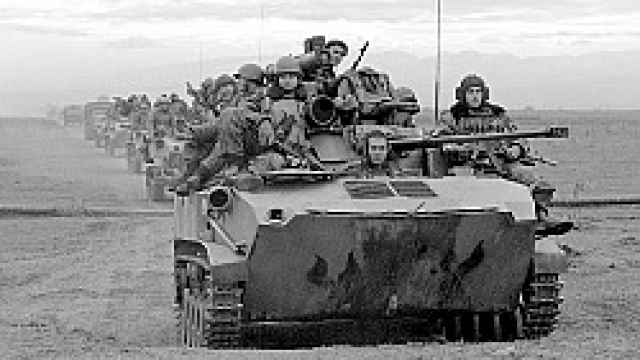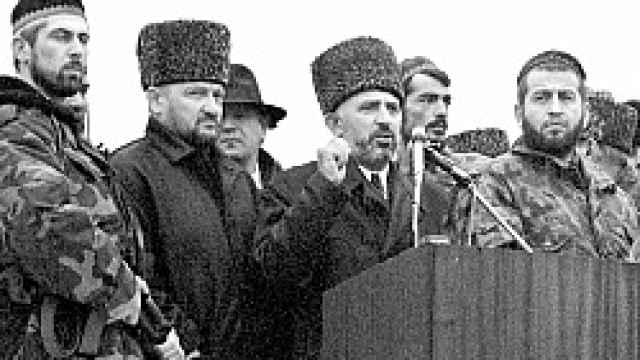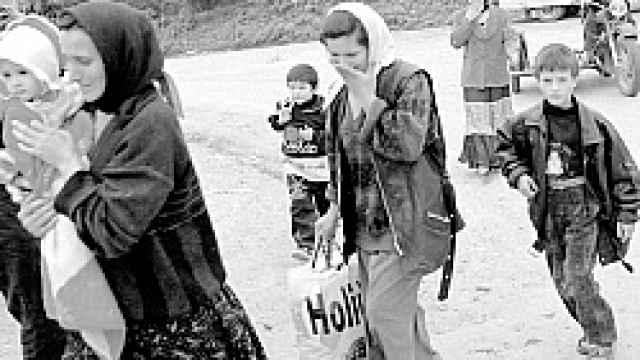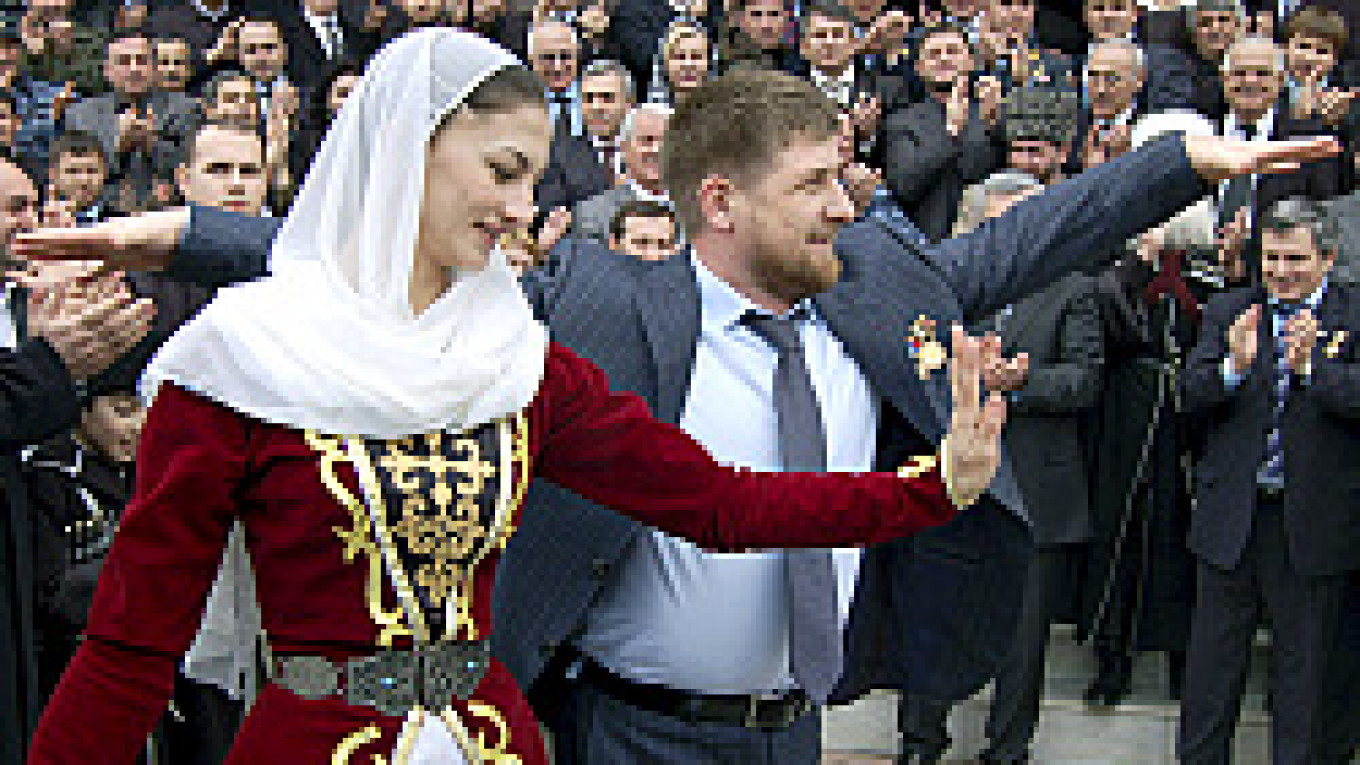Vladimir Putin made what seemed to be an implausible promise in August 1999. The newly appointed prime minister said he could end a crisis caused by the incursion of 2,000 rebels from Chechnya into Dagestan in "a week and a half or two weeks."
Putin not only made good on his promise, but also went on to reassert Moscow's authority over Chechnya and pacify the turbulent republic, greatly reducing the risk that it and other regions would secede from Russia.
The price at which this was achieved, however, casts a long shadow over Putin's eight-year rule. The struggle over Chechnya has left thousands of bodies in its wake, many of them ordinary people.
Questions also linger over the Kremlin's claim that Chechnya-based warlords ordered a series of apartment bombings in the autumn of 1999. The explosions, which killed more than 300 people, served as an impetus for the start of the second Chechen war.
To Putin's credit, the second war was nothing like the first, which Boris Yeltsin infamously described as the worst mistake of his presidency.
"Compared with Yeltsin's handling of Chechnya, Putin's conduct was an obvious success," said Arthur Martirosyan, a U.S.-based conflict management expert who helped mediate peace talks in the first 1994-96 Chechen war. "However, if one were to evaluate outcomes against initial policy goals, Putin's success would be less spectacular."
Back in August 1999, Chechnya was a failing de facto independent state and the base for notorious warlords such as Shamil Basayev and Khattab. That month, the two men led 2,000 well-armed rebels, many of them Dagestanis, into Dagestan, taking control of one settlement after another. The threat of secession was so real that then-Prime Minister Sergei Stepashin publicly admitted, "We could lose Dagestan."
Insurgency had been growing in the North Caucasus for months, while the ruling elite in Moscow was busy fighting for power under an ailing Yeltsin.
But then Yeltsin abruptly fired Stepashin in early August and appointed Putin, the little-known director of the Federal Security Service, as his fifth prime minister in 17 months. Putin made the promise to drive the insurgents out of Dagestan on Aug. 10, and federal troops and local vigilantes, whom the authorities agreed to arm, announced that they had succeeded on Aug. 25.
| ||||
Putin's tough stance over Chechnya, combined with the shock over the explosions, sent his popularity soaring, putting him in place to become president when Yeltsin abruptly resigned on Dec. 31, 1999. Putin took just over 50 percent of the vote in a snap presidential election in March 2000, winning without a second round of voting.
 Yuri Tutov / AP Federal troops taking positions outside Gudermes, Chechnya's second-largest city, on Nov. 1, 1999. A full-scale military campaign was under way in the republic. | |
After a lengthy investigation, the authorities concluded that Khattab ordered the attacks, and courts have convicted several members of the North Caucasus-based insurgency and terrorist networks of carrying them out.
Khattab, who was born in Saudi Arabia, denied involvement. He died in 2002 after receiving a poisoned letter from an FSB agent.
The purported organizer of the Moscow blasts, Achemez Gochiyayev, remains on the run. He has said he unwittingly planted explosives on behalf of the FSB.
Several prominent figures have directly accused the FSB of organizing the blasts, including former FSB officer Alexander Litvinenko, who died after drinking poisoned tea in London in 2006.
The FSB and the Kremlin have denied involvement in the explosions and Litvinenko's death.
Right after the bombings, Moscow demanded that Chechen President Aslan Maskhadov extradite a group of suspects linked to both the attacks and the incursion into Dagestan. When Maskhadov refused, federal forces began a large-scale bombing campaign in Chechnya, followed by ground operations.
2 Very Different Wars
As the second war unfolded, several major differences from the first war began to emerge.
 Adlan Khasanov / Reuters Maskhadov, center, and Akhmad Kadyrov, second left, in Grozny in early 1999. | |
Indeed, Putin rejected several proposals by Maskhadov to suspend hostilities and hold talks.
Also, public opinion saw a sea change in the second war, with Putin seeing a groundswell of support for his plan to "waste" rebels in the outhouse after the apartment bombings. Public opinion remained on Putin's side after the initial anger had faded. Unlike during the first war, all the national television channels -- the main source of news for most Russians -- offered no critical coverage of the military's conduct or the casualties suffered. Under Putin, control of the channels passed into state hands. Critical journalists like Andrei Babitsky were forced to leave Russia. Reporter Anna Politkovskaya, perhaps the harshest critic of the conduct of federal troops and pro-Moscow Chechen forces, was gunned down in Moscow in 2006.
But perhaps the most important difference in the second war was that the Kremlin managed to win the support of powerful Chechen clans by offering them money and assurances of power once the war ended. Among the clans were several that had fought federal troops in the first war, including those led by Akhmad Kadyrov and the Yamadayev brothers. Traditionally pro-Moscow groups, such as that headed by former Grozny Mayor Beslan Gantamirov, also backed the federal forces in the second war.
Hundreds, if not thousands, of insurgents switched sides, enrolling in various pro-Kremlin agencies, such as the police force and local presidential security service. This spelled the beginning of the end for Chechnya's de facto independence and allowed the Kremlin to "Chechenize" the policing of the republic and later its public administration.
 Reuters Chechens fleeing Ishoi-Yurt village during a bombing campaign Sept. 19, 1999. | |
After federal forces captured all towns and strongholds by early 2001, forces loyal to Kadyrov, the Yamadayevs and allied clans took up the task of hunting rebels across Chechnya.
Putin threw his personal support behind Kadyrov by appointing him the head of Chechnya's temporary administration in 2000.
"If Moscow had not bet on the local elite, the war would still be under way now," the Chechen official said.
Former rebels filled the ranks of the new law enforcement agencies, providing Moscow with insight into rebel tactics, connections with the local population and a knowledge of the terrain. By 2005, 5,000 kadyrovtsy -- officers in the local presidential security service and an anti-terrorist center -- were reporting directly to Kadyrov's son, then-First Deputy Prime Minister Ramzan Kadyrov. The kadyrovtsy are now part of the Chechen branch of the Interior Ministry, as well as the new South and North battalions of the Interior Troops. In addition, the Main Intelligence Directorate of the General Staff has two battalions -- called East and West -- manned by Chechens.
Moscow's success in gradually transforming the war from a large-scale military offensive, which resulted in civilian casualties and collateral damage, to seek-and-destroy operations by groups of federal and Chechen commandos prevented the Chechen population from turning en masse against Moscow, as it did in the first war. The military did provoke an outcry when troops in December 1999 carried out a so-called mopping-up operation in the village of Alkhan-Yurt and, according to people who fled, summarily executed 41 civilians.
Basayev Fights Back
Sensing that they were losing the war, Basayev and other more radical factions within the insurgency organized a series of terrorist attacks, including the hostage-taking at Moscow's Dubrovka theater in 2002, which killed 129 people. The high death toll failed to soften the Kremlin's resolve.
Then Basayev organized a series of terrorist attacks in the second half of 2004, including suicide bombings on two planes and culminating in the Beslan school hostage-taking. More than 330 people died in the school, many of them children, forcing Basayev to admit that he had miscalculated the Kremlin's determination to end insurgency by all means possible.
The impact of the attacks on the public was limited compared with Basayev's bloody hostage-taking raid in Budyonnovsk in 1995, because television channels were under state control and other media outlets faced the tight restrictions on access and coverage introduced after Dubrovka.
Putin used Beslan to toughen laws on terrorism and expand the powers of law enforcement agencies. But he did not stop there. Putin also used the attack as a pretext for introducing measures that had little to do with fighting terrorism and a lot with consolidating power in the Kremlin, such as scrapping the election of regional governors.
Basayev -- disappointed by Beslan's failure to force the Kremlin into negotiations over Chechnya but determined to continue -- hinted in an interview with Babitsky that he would consider attacks of catastrophic proportions to try to coerce the Kremlin. But Basayev was killed by federal commandos in 2006 before he could organize a major new attack. Federal forces also killed Maskhadov, the former Chechen president, as well as his successor, Abdulkhalim Sadullayev, and a number of Arab lieutenants who had planned attacks and arranged financing for the insurgency.
The fighting in Chechnya subsided into a low-intensity conflict, allowing the Kremlin to organize a closely orchestrated presidential election in 2003 that reaffirmed Akhmad Kadyrov's position as president.
Kadyrov was assassinated during a military parade in May 2004. After Kadyrov died, career police officer Alu Alkhanov took over until Kadyrov's son, Ramzan, turned 30 in October 2006. He officially became president in March 2007.
Meanwhile, the insurgency continued to weaken as federal and local forces kept the rebels on the run. The current rebel leader, Doku Umarov, lacks the influence, charisma and international ties that Basayev had. Umarov has failed to stop rebels from defecting to the other side, and hundreds have surrendered in Chechnya and Dagestan in recent months. Even without an amnesty offer, more than 300 rebels laid down their arms in response to an appeal by FSB director Nikolai Patrushev shortly after Basayev's death.
Around 450 rebels remained in Chechnya last fall, Deputy Interior Minister Lieutenant General Arkady Yedelev said in November. Chechnya's leadership puts the figure at less than 100.
Repeated attempts to obtain comment from rebel representatives were unsuccessful. Former rebel envoy Akhmed Zakayev did not return calls to his cell phone in Britain, where he lives in asylum.
Mairbek Vatchagaev, a former spokesman for Maskhadov who now works for a U.S.-based think tank, the Jamestown Foundation, declined to comment. Former rebel foreign minister Ilyas Akhmadov, who has been granted asylum in the United States and is wanted in Russia on charges related to the 1999 incursion, also declined to comment.
A Tense Calm
One sign that the Kremlin believes the Chechen threat has eased is its gradual withdrawal of troops. Federal commanders plan to leave only one army division and one brigade of Interior Troops permanently deployed in Chechnya, with the local police bearing the brunt of law enforcement work.
As a result, the simmering discontent these days appears to be largely directed at the local Chechen authorities rather than at Moscow.
"Sadly, mopping-up operations continue, although they are now more frequently carried out by local power structures, so the sense of injustice and resentment is unlikely to disappear any time soon," said Adam Dolnik, a terrorism researcher at the Centre for Transnational Crime Prevention in Australia who has done extensive field research in the North Caucasus.
"But even if this resentment is channeled violently, it essentially targets the local power structures and not Russia. So in the short term at least, you could say that the divide-and-conquer strategy has paid dividends to Russia," he said.
In addition to successfully fighting the insurgency, Ramzan Kadyrov has proved very effective in mobilizing the federal authorities and Chechen businesses both inside and outside the republic to finance Chechnya's reconstruction.
Kadyrov, who has accumulated a fortune of his own, has also been trying to prevent the funds from being embezzled by hiring independent auditors for state-funded projects, said a North Caucasus businessman who used to run a construction business in Chechnya.
Under Kadyrov, the Chechen authorities have been steadily increasing budget revenues generated in the republic, including local taxes, thanks to incremental economic growth and other factors.
Local revenues totaled 1.8 billion rubles in 2004, but more than doubled over the next three years to 4.2 billion rubles, Taisa Makhasheva, head of the budgeting department of the Chechen Finance Ministry, said by telephone from Grozny.
Federal subsidies, however, still account for most of the local budget. Chechnya's budget amounted to 28 billion rubles in 2007, including 24.4 billion rubles from the federal government, Makhasheva said.
This year, the budget is 33 billion rubles, including 4.6 billion in local revenues and 28 billion rubles from the federal budget, Makhasheva said. The projected budget deficit is 260 million rubles.
Despite growing spending, Chechnya lags far behind other regions in economic growth.
Whether Chechnya will remain calm is unclear.
"People have come to understand that personal freedom is more important and that you can have this freedom without living in an independent state," the Chechen government official said.
"Who knows how long this understanding will last, maybe one or two generations, depending on whether a real threat arises to the personal freedom of Chechens," he said.
Staff Writer Nabi Abdullaev contributed to this report. Previous reports in the Putin's legacy series can be found online at www.themoscowtimes.com.
A Message from The Moscow Times:
Dear readers,
We are facing unprecedented challenges. Russia's Prosecutor General's Office has designated The Moscow Times as an "undesirable" organization, criminalizing our work and putting our staff at risk of prosecution. This follows our earlier unjust labeling as a "foreign agent."
These actions are direct attempts to silence independent journalism in Russia. The authorities claim our work "discredits the decisions of the Russian leadership." We see things differently: we strive to provide accurate, unbiased reporting on Russia.
We, the journalists of The Moscow Times, refuse to be silenced. But to continue our work, we need your help.
Your support, no matter how small, makes a world of difference. If you can, please support us monthly starting from just $2. It's quick to set up, and every contribution makes a significant impact.
By supporting The Moscow Times, you're defending open, independent journalism in the face of repression. Thank you for standing with us.
Remind me later.


